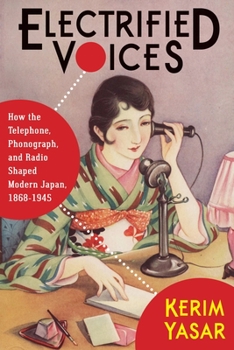Electrified Voices: How the Telephone, Phonograph, and Radio Shaped Modern Japan, 1868-1945
(Part of the Studies of the Weatherhead East Asian Institute, Columbia University Series)
Select Format
Select Condition 
Book Overview
Long before karaoke's ubiquity and the rise of global brands such as Sony, Japan was a place where new audio technologies found eager users and contributed to new cultural forms. In Electrified Voices, Kerim Yasar traces the origins of the modern soundscape, showing how the revolutionary nature of sound technology and the rise of a new auditory culture played an essential role in the formation of Japanese modernity.
A far-reaching cultural history of the telegraph, telephone, phonograph, radio, and early sound film in Japan, Electrified Voices shows how these technologies reshaped the production of culture. Audio technologies upended the status of the written word as the only source of prestige while revivifying traditional forms of orality. The ability to reproduce and transmit sound, freeing it from the constraints of time and space, had profound consequences on late nineteenth-century language reform; twentieth-century literary, musical, and cinematic practices; the rise of militarism and nationalism in the 1920s and 30s; and the transition to the postwar period inaugurated by Emperor Hirohito's declaration of unconditional surrender to Allied forces--a declaration that was recorded on a gramophone record and broadcast throughout the defeated Japanese empire. The first cultural history in English of auditory technologies in modern Japan, Electrified Voices enriches our understanding of Japanese modernity and offers a major contribution to sound studies and global media history.Format:Paperback
Language:English
ISBN:0231187130
ISBN13:9780231187138
Release Date:October 2018
Publisher:Columbia University Press
Length:304 Pages
Weight:1.00 lbs.
Dimensions:0.9" x 6.0" x 8.9"
Customer Reviews
0 rating





